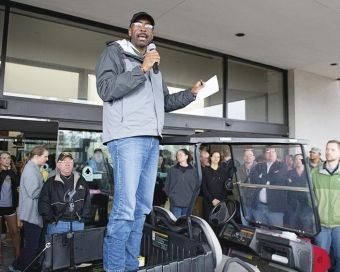Three days after he was appointed as the next president of the University of Southern Mississippi, Rodney D. Bennett turned on the Weather Channel and saw that the institution's once-pristine campus had been devastated by a tornado.
Winds had ripped off the top floor of the alumni center in which he had just been celebrating. Dozens of oak trees had been uprooted, the interior of the fine-arts building exposed, and at least a half-dozen structures badly battered. His heart sank.
"I felt a sense of loss, as if I'd always been at that institution and a part of that community," he says.
Mr. Bennett, 46, who was then vice president for student affairs at the University of Georgia, wasn't expected to start work in Hattiesburg, Miss., until April 1. But on February 11, the day after the tornado, he began helping direct a rebuilding effort on the campus, which had suffered tens of millions of dollars in damage.
Ned Nelson, a junior who organized a campus cleanup that week, says that "everyone felt kind of lost and out of place, seeing icons like the alumni house demolished."
About 1,000 volunteers, mostly students, collected more than 1,400 bags of debris in the effort. Mr. Bennett, who had driven from his home, in Athens, Ga., the day after the tornado, worked alongside them. "Having him jump in and get his hands dirty with us before he even took office was very reassuring," Mr. Nelson says.
Mr. Bennett says the experience likewise reassured him that he'd come to the right place. "Through something so horrible and frightening," he says, "I saw the best of people come out."
Mr. Bennett, who has now officially started his job, is the first black president of a predominantly white university in Mississippi. He plays down the significance of his breakthrough appointment, but, when pressed, has said he'd like to show young people that education can help them attain goals they might have thought unreachable.
He succeeds Martha D. Saunders, who stepped down last year, citing personal reasons, and in November was appointed provost of the University of West Florida. Her resignation coincided with the release of an internal audit showing that the university's athletics program was more than $1-million in the red. Mr. Bennett says the athletics director has presented him with a preliminary plan to right the program's financial problems, but he declined to provide details.
Rebuilding the campus is the first order of business. Mr. Bennett was relieved to learn that the alumni house, which was built in 1912, can be repaired, and that most of the damage to buildings is covered by insurance. Last week he announced a fund-raising effort to restore the landscape, most of which won't be covered by insurance.
Mississippi lawmakers also came to the university's aid, approving $1.65-million for campus renovation and repairs and an additional $1.1-million to replace musical instruments and damaged equipment.
The new president is looking forward to getting back to his other priorities, including improving the university's six-year graduation rate, which is now 40 to 45 percent. He says he hopes to do that by developing closer relationships between faculty members and students, improving academic advising, and setting higher expectations during freshman orientation. State support, he says, "is going to be tied to how well we're performing."
He also wants to raise faculty and staff salaries, which have remained stagnant in recent years. To make that possible, he hopes to leverage his experience in student affairs to increase enrollment and bring in more tuition dollars.
The state's higher-education commissioner, Hank M. Bounds, says that when Mr. Bennett arrived on the campus, he encouraged administrators to "look at the recovery process from every angle" and was "thoughtful and decisive."
Mr. Bounds says Mr. Bennett's race had no bearing on his selection. Still, he adds, "it says to the rest of the world that we're not the same old Mississippi."
